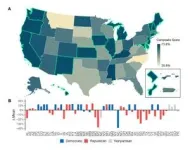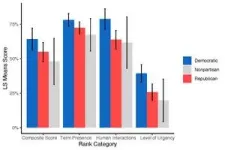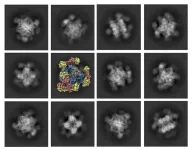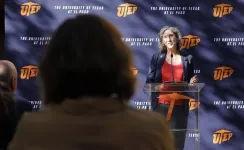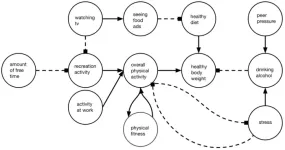(Press-News.org) CHAMPAIGN, Ill. — As much of the U.S. broils under record-setting temperatures, battles wildfires and is rocked by fierce storms, a new study suggests that the science learning standards for many public schools are not preparing young people to understand and respond to problems such as climate change that will dramatically impact their lives and those of millions of people around the globe.
Published in the Proceedings of the Royal Society B: Biological Science, the findings raise troubling questions about political bias shaping if and what the nation’s youths are learning about looming environmental crises and what these portend for the Earth’s inhabitants.
The quality and depth of the information that today’s K-12 students receive on planetary health issues vary widely across the U.S. and reflect the states’ and territories’ dominant political ideology and major industries when they adopted their science standards, say the researchers, most of who were graduate students at the University of Illinois Urbana-Champaign when they conducted the study.
They were inspired to investigate what K-12 students are learning about planetary health after taking a course on the topic led by U. of I. entomology professor and co-author Brian F. Allan, who is also the associate director for academic affairs in the School of Integrative Biology.
They found that many of the state science standards lack detailed explanations of environmental problems such as global warming and do not portray them as imminent threats or connect them with human activities such as burning fossil fuels.
“It’s deeply concerning that it’s a politicized issue,” said first author Samantha L.R. Capel, a conservation population genomicist with the Wildlife Genetics Research Laboratory in the California Department of Fish and Wildlife. “It really shouldn’t be because the health of our planet affects us all, and it’s at the detriment of our education system and our students who will be voting one day.”
Her co-authors included U. of I. alumni Lynette Strickland, a biology professor at Boston University; Alonso Favela, a postdoctoral scholar at the University of California, Irvine; C. Scott Clem, a postdoctoral research associate at the University of Georgia; and Stephany Virrueta Herrera, a biology instructor at Cristo Rey Jesuit High School, Chicago. U. of I. graduate students Sean Khan Ooi and Loralee J. Wilson also co-wrote the paper.
Team members assessed each state’s or territory’s entire set of science standards that were in effect in July 2020 on the presence and framing of five fundamental concepts and 10 major issues that they deemed critical for students’ comprehensive understanding of planetary health and the current trajectory of the global climate crisis.
Their analysis included the Next Generation Science Standards – national standards that were developed by a bipartisan group of researchers, educators and administrators from 26 states to improve and align science education for students across the U.S. The NGSS have been adopted by 17 states, the District of Columbia and Guam.
The team rated each standard on three dimensions: whether a term or phrase such as “evolution” was presented and the extent of its description; the degree to which a concept was described as affected by or affecting humans; and the level of urgency conveyed about mitigating potential threats.
A composite score was calculated for each standard, which represented the average of all its dimension scores. Mississippi’s science standards had the highest composite score at 73.8% while North Carolina had the lowest score at 20.8%. The NGSS were among the highest performers, ranked first in human impacts – but fourth in level of urgency – and third overall.
At the time first-ranked Mississippi and last-ranked North Carolina adopted their standards, they were led by Republicans and Democrats, respectively, the team found.
Yet “our data really does support this idea that Republican-led states are not doing as good a job teaching these concepts to their kids as Democrat-led states,” Capel said.
Overall, the science standards in Democrat-led states scored 18% higher on connecting environmental problems with human behavior and 33% higher on the level of urgency conveyed about mitigating these factors, the team said.
Across all the states, the team found broad disparities in the inclusion of critical terminology. Although “ecosystem” was included in nearly all the standards (91.8%), “endangered species” was mentioned in only about one-third (31.6%) of them.
“It’s incredibly, fundamentally unjust the amount of variation that we’re seeing in terms of the science students have access to,” said Strickland, the senior author of the study. “Some of the states that did the worst are among those that are going to have some of the worst crises in terms of climate – such as Louisiana, Texas and Florida.”
“Conservation,” “extinction” and “endangered species” were described as the least urgent problems – with scores of 16.7%, 12% and 10.6%, respectively – while “waste/pollution” ranked the highest at 41.2%, the team found.
“We were very surprised to see how little urgency was conveyed in terms of topics like climate change in these K-12 science standards because they essentially didn’t relay these concepts in ways that would give the impression students are being taught that these are problems that need to be solved urgently,” Allan said.
States dominated by agricultural industries had the highest scores whereas states dominated by manufacturing industries scored the lowest, although the researchers were uncertain about the causal nature of these relationships.
While the standards represent the minimum learning schools are expected to provide for their students, the team emphasized that many educators transcend these expectations.
“There are many teachers that do recognize climate change for the crisis that it is and see the trajectory of planetary health and how it’s going to affect their students,” Capel said.
“There are plenty of teachers across the country that are going beyond these educational standards and using their own language, tools and examples to enhance their students’ educational experience. However, they need to be supported by state-mandated education standards.”
END
State politics, industry drive planetary health education for K-12 students in US
Depth, breadth of information about environmental issues varies widely, study finds
2023-09-27
ELSE PRESS RELEASES FROM THIS DATE:
UCLA-led team develops key improvement to Nobel Prize-winning technology
2023-09-27
The scientists who received the 2017 Nobel Prize in chemistry were honored for their development of a technique called cryo-electron microscopy, or cryo-EM. The technology was revolutionary because it enabled scientists to see the atomic structure of biological molecules in high resolution.
But cryo-EM still had a catch: It was only effective for imaging large molecules.
Now, UCLA biochemists, working with pharmaceutical industry scientists, have developed a solution that will make it possible for cryo-EM to acquire high-quality images of smaller protein molecules, too. The scientists engineered a 20 nanometer, cube-shaped ...
UTEP awarded $7 million to support Hispanic-serving institutions across the country
2023-09-27
EL PASO, Texas (Sept. 27, 2023) — The University of Texas at El Paso has been chosen to become a center of thought leadership for Hispanic Serving Institutions (HSIs) across the country, thanks to a new $7 million grant from the National Science Foundation (NSF).
The new grant, known as NODE (Network Opportunities for Developing Equitable and Effective Evaluation at HSIs), is a six-year investment that will position UTEP to provide the first full portrait of the effectiveness of all grants funded by the NSF HSI program. Anne-Marie Núñez, Ph.D., executive director of the Diana Natalicio Institute ...
JWST's first spectrum of a TRAPPIST-1 planet
2023-09-27
Image
In a solar system called TRAPPIST-1, 40 light years from the sun, seven Earth-sized planets revolve around a cold star.
Astronomers obtained new data from the James Webb Space Telescope (JWST) on TRAPPIST-1 b, the planet in the TRAPPIST-1 solar system closest to its star. These new observations offer insights into how its star can affect observations of exoplanets in the habitable zone of cool stars. In the habitable zone, liquid water can still exist on the orbiting planet's surface.
The ...
Wild Asian elephants display unique puzzle solving skills
2023-09-27
New York, September 27, 2023 – Individual innovation is considered one sign of intelligence within species, and elephants are among the animals that researchers have long taken an interest in because of their sophisticated approach to problem solving. A newly published study in the journal Animal Behaviour details findings from a six-month-long study documenting the abilities of individual wild Asian elephants to access food by solving puzzles that unlocked storage boxes.
“This is the first research study to show that individual wild elephants have different willingness and abilities to problem solve in ...
Mainstay malaria drug may be beginning to fail in the Horn of Africa
2023-09-27
In eastern Africa, malaria parasites have developed resistance to artemisinins, the backbone of current treatment regimens, a development that could dramatically worsen malaria’s impact if partner drugs fail in the future.
The finding from studies in Eritrea was reported Sept. 28 in the New England Journal of Medicine by a team of researchers led by Didier Ménard, PhD, of the Université de Strasbourg/Institut Pasteur in France and including Columbia University microbiologist David Fidock, PhD, the C.S. Hamish Young Professor of Microbiology & Immunology and professor of medical sciences in the Vagelos College of Physicians and Surgeons.
Treatment ...
Separating molecules requires lots of energy. This new, heat-resistant membrane could change that
2023-09-27
BUFFALO, N.Y. – Industry has long relied upon energy-intensive processes, such as distillation and crystallization, to separate molecules that ultimately serve as ingredients in medicine, chemicals and other products.
In recent decades, there has been a push to supplant these processes with membranes, which are potentially a lower-cost and eco-friendly alternative. Unfortunately, most membranes are made from polymers that degrade during use, making them impractical.
To solve this problem, a University at Buffalo-led research team ...
MSU works to make drinking water safer by fighting contaminants
2023-09-27
EAST LANSING, Mich. – Providing safe drinking water was a great public health achievement in the 20th century, yet problems persist. According to the Centers for Disease Control and Prevention, about 7.15 million waterborne illnesses occur in the United States annually resulting in 601,000 emergency room visits, 6,630 deaths and $3.33 billion in direct health care costs. Michigan State University, a world leader in water research, is working to make our drinking water safer.
MSU has been awarded a $2.1 million grant from the U.S. Environmental Protection ...
Want to make better decisions? Ask for less information, not more
2023-09-27
When people have to make a tough decision, their first instinct is usually to gather as much information as possible. Just one problem: according to research published this week in Cognitive Research: Principles and Implications, most people’s decision-making actually gets worse, not better, when you give them additional facts and details.
“It’s counterintuitive, because we all like to think we use information wisely to make smart decisions,” said Farber Chair Associate Professor ...
HMS researcher to lead $104 million federal project tackling antibiotic resistance
2023-09-27
At a glance:
Johan Paulsson, HMS professor of systems biology, will lead project studying bacterial behavior and antibiotic resistance.
Efforts will focus on developing technology to improve diagnosis, speed discovery of new antibiotics, and illuminate basic mechanisms of bacterial behavior.
Harvard Medical School researcher Johan Paulsson will lead a multi-institutional $104 million effort to study bacteria and antibiotic resistance, the U.S. Department of Health and Human Services announced today.
The work is funded by the newly established Advanced Research Projects Agency for Health (ARPA-H) in an ...
Study provides new look at why rare cancer often evades treatments
2023-09-27
BOSTON - Researchers at Boston Medical Center and Dana-Farber Cancer Institute conducted one of the first-ever analyses of neuroendocrine tumors (NETs) at single cell resolution, unlocking new insights into this rare and often hard-to-treat cancer. The findings represent a tremendous leap forward in understanding why these tumors are largely resistant to immunotherapy and provide key insights that could lead to future treatments.
“This study was a tour-de-force that catalyzed the efforts and innovations of researchers across Boston – including Boston Medical Center and Dana-Farber Cancer Institute - and has resulted in a better understanding ...
LAST 30 PRESS RELEASES:
University of Ottawa Heart Institute, the University of Ottawa and McGill University launch ARCHIMEDES to advance health research in Canada
The world’s largest brain research prize awarded for groundbreaking discoveries on how we sense touch and pain
Magnetofluids help to overcome challenges in left atrial appendage occlusion
Brain-clearing cells offer clues to slowing Alzheimer’s disease progression
mRNA therapy restores fertility in genetically infertile mice
Cloaked stem cells evade immune rejection in mice, pointing to a potential universal donor cell line
Growth in telemedicine has not improved mental health care access in rural areas, study finds
Pitt scientists engineer “living eye drop” to support corneal healing
Outcomes of older adults with advanced cancer who prefer quality of life vs prolonging survival
Lower music volume levels in fitness class and perceived exercise intensity
Of crocodiles, counting and conferences
AERA announces 2026 award winners in education research
Saving two lives with one fruit drop
Photonic chips advance real-time learning in spiking neural systems
Share of migratory wild animal species with declining populations despite UN treaty protections worsens from 44% to 49% in two years; 24% face extinction, up 2%
One in 20 babies experiences physical abuse, global review finds
Tundra tongue: The science behind a very cold mistake
Targeting a dangerous gut infection
Scientists successfully harvest chickpeas from “moon dirt”
Teen aggression a warning sign for faster aging later in life
Study confirms food fortification is highly cost-effective in fighting hidden hunger across 63 countries
Special issue elevates disease ecology in marine management
A kaleidoscope of cosmic collisions: the new catalogue of gravitational signals from LIGO, Virgo and KAGRA
New catalog more than doubles the number of gravitational-wave detections made by LIGO, Virgo, and KAGRA observatories
Antifibrotic drug shows promise for premature ovarian insufficiency
Altered copper metabolism is a crucial factor in inflammatory bone diseases
Real-time imaging of microplastics in the body improves understanding of health risks
Reconstructing the world’s ant diversity in 3D
UMD entomologist helps bring the world’s ant diversity to life in 3D imagery
ESA’s Mars orbiters watch solar superstorm hit the Red Planet
[Press-News.org] State politics, industry drive planetary health education for K-12 students in USDepth, breadth of information about environmental issues varies widely, study finds

